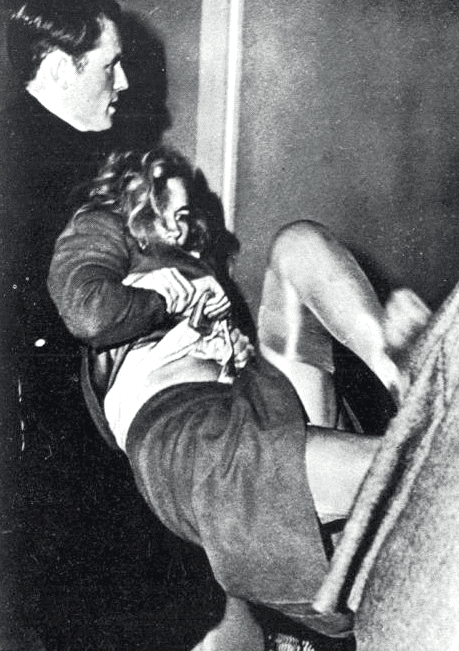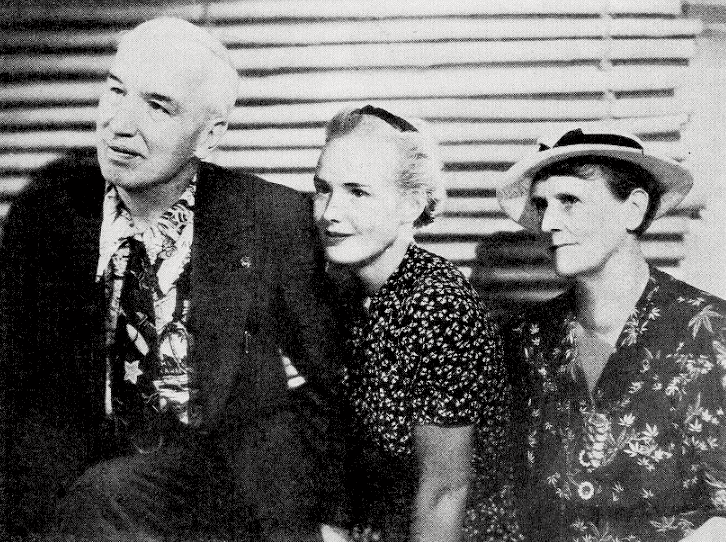Classic Hollywood starlets are often best remembered for their personal lives instead of the mark they made on film—there’s the tragic and short life of Marilyn Monroe; the many marriages of Elizabeth Taylor; and the violent death of Lana Turner’s boyfriend at the hands of her daughter. And while Frances Farmer may have had a successful film career in the late 30s and early 40s, she’s most often remembered for her battles with mental illness—which included an involuntary commitment to a psychiatric hospital, claims of abuse within the institutions where she was a patient, and even a rumored lobotomy. So what really happened to Frances Farmer to have led to a such a checkered legacy?
 Flickr
Flickr
The instability in the beginning of Frances Farmer’s life echoed the tragedy of her adulthood. She was born in Seattle, Washington to Lillian and Ernest Melvin Farmer, a dietician and a lawyer, respectively. Her parents separated when she was just four years old, and she moved with her mother, first to Los Angeles and then ultimately to Chico, California. When her mother found work in nutrition research, she realized that caring for her children was hindering her career, so she sent Frances and her siblings back to Seattle. Farmer later admitted that that moment, when she was just a tyke, led her to realize she couldn’t rely on her parents, or adults in general—a harsh realization for such a young girl. This uncertainty continued when her mother returned to Seattle. Her parents continued to live together despite their estrangement, finally divorcing when Frances was 16.
Farmer showed an existentialist streak early on, controversially winning $100 for an essay she called “God Dies” in a Scholastic Magazine writing contest as a senior in high school. The essay was influenced by Nietzsche, and involved her struggle to hold onto the idea of a benevolent God in what she saw a cruel and unpredictable world. Later, she won another contest sponsored by a leftist newspaper, where the prize was a trip to the Soviet Union, leading to later speculation that she was a Communist.
Her 1935 trip to the Soviet Union didn’t lead her to start organizing for the local leftist groups, but she did use it as a stepping stone in another way—on the way home, she stopped off in New York City and stayed there, hoping that it would be the start of her career in theater. Very quickly, she met a talent agent who helped her sign a contract with Paramount, leading her to relocate to Hollywood, all in a very short time—and all at just 22 years old.
 Getty Images
Getty Images
In 1936, she was married for the first time, and also got her first starring role in a film called Border Flight. She then went on to star opposite Bing Crosby in a Western titled Rhythm on the Range. As a young wife, she was more interested in time at home with her husband than in parties and award shows, and so the studio struggled to brand her in the same way they did with actors who played into the Hollywood game. She began to clash with directors on set, and with the studio over their insistence that her private life should be more public. Ironically, the sordid details of her private life would soon come to completely overshadow her career achievements.
In the next few years, Farmer went back and forth between doing theater, mainly in New York, and continuing to make films with Paramount to fulfill her contract with them. During this time, she began to suffer from depression, and she used alcohol as a way to deal with it. This led to problems both on- and off-set, including a departure from a stage adaptation of Ernest Hemingway’s The Fifth Column during rehearsals, which netted her a fine from the Theater Guild. On top of that, Paramount voided her contract after she refused to take a role, and her marriage disintegrated, with her divorce being finalized in 1942.
Farmer wasn’t even 30 years old, but her A-list career and marriage had both faltered in the wake of her battle with depression. Sadly, it was about to get worse. While Farmer had previously tried so ardently to deflect attention from her private life, she couldn’t seem to stay out of the tabloids. There were multiple arrests for disorderly conduct, public feuds with her former in-laws, and rumors about the actor parading down Sunset Boulevard topless after a bar brawl. After a courtroom outburst, she was sentenced to 180 days in jail.
 Wikimedia Commons
Wikimedia Commons
Clearly, Farmer was having issues that ran much deeper than just acting out—though these weren’t addressed in her time in court. However, thanks to help from her former sister-in-law, of all people, she would finally be able to get help. Her sister-in-law petitioned for her to be transferred from jail to the psychiatric ward of the Los Angeles General Hospital. She was transferred from there to the Kimball Sanitarium, where she was diagnosed with paranoid schizophrenia.
If this story were to take place in 2018, this would hopefully be the moment where Farmer received treatment and care that could help her get her life back on track, but psychiatric medicine in the 1940s was quite different than what we’d expect from doctors today—with “cures” that seem more torturous than therapeutic. One treatment that Farmer was immediately subjected to was insulin shock therapy, where the patient is put into successive insulin comas, which can cause severe nausea, brain damage, or even, in extreme cases, death.
Farmer later made a dramatic escape from the institution and confided in her family about the insulin treatments, who then complained to the courts that they’d never consented to such severe measures. She claimed to have been put into successive daily comas over the course of 90 days—a much more serious regimen that was normally prescribed. Her mother undertook a legal battle to have her released, and ultimately won, but when the two got into a physical altercation, Farmer’s mother had her institutionalized once again.
 Wikimedia Commons
Wikimedia Commons
Farmer spent the next few years in and out of both the hospital and her mother’s house. When she was formally discharged from the hospital's jurisdiction, no one bothered to tell her, so she lived in constant fear of being sent back to Western State Hospital in Washington. When she finally discovered that she’d been officially discharged, she took a job sorting laundry at a local hotel—in a twist of tragic irony, that same hotel had once hosted the world premiere of one of her movies.
Years passed quietly before Farmer attempted a comeback at the behest of her third husband. She tried to set the record straight about her downfall and did interviews opening up about her past struggles. She mounted her comeback in television and theater, and it was mostly successful, save for a few blips here and there—a drunk driving charge among them. Generally, she became less of a target for the tabloids—that is, until after her death.
In 1970, Farmer died at the age of 56 after a quick battle with esophageal cancer. But, for all her insistence on keeping her private life private, Frances Farmer really became a household name when her absolutely sensational posthumous memoirs were released under the name Will There Really Be a Morning? in 1972. They revealed the true extent of her treatment at Western State Hospital, alleging sexual assaults by male staff and being made to eat her own excrement. Among other claims, she said that: "I was raped by orderlies, gnawed on by rats and poisoned by tainted food. I was chained in padded cells, strapped into strait-jackets and half-drowned in ice baths.”
Further attention was drawn to Farmer’s treatment in Kenneth Anger’s infamous tell-all book Hollywood Babylon, where he named her the "Patron Saint of the Mad Starlets." Both books were swift in their condemnation of the two systems that had failed Frances Farmer—whereas her memoir placed the blame on the mental health system, Hollywood Babylon claimed that it was Hollywood itself that had failed Farmer when she was at her most vulnerable.
Will There Really Be a Morning? also worked to clear Farmer’s name of all the scandals that had plagued her in her life, but sadly, outrageous rumors would follow her even in death. In 1978, a highly fictionalized account of Farmer’s life titled Shadowland was released. In it, the book’s author, William Arnold, claimed a transorbital lobotomy had been performed on Farmer during her time at Western State. Later, Arnold revealed that the book was highly fictionalized, but the damage was done—a movie version of Farmer’s life, titled Frances, depicted the procedure, and the “lobotomized starlet” became her legacy.

There was much more to Frances Farmer than just her rumored lobotomy and her time spent institutionalized, but her screen and stage appearances have been overshadowed by the more scandalous parts of her personal life. Farmer was failed by her family, and in death, by a fame-hungry biographer. But mostly, she was failed by Hollywood, who dropped her like a hot potato as soon as her battle with depression made her seem too difficult.
Farmer’s problems with the Hollywood system are also a general problem in the movie business: a high degree of sensitivity and vulnerability is expected from its performers, but when they’re too sensitive or vulnerable, they’re chewed up and spit out. Farmer was far from the first star to seem to crack under pressure, and sadly, she wouldn’t be the last. Young actors who try and treat their problems often have their attempts sensationalized—think of the coverage of the infamous involuntary psychiatric hold placed on Britney Spears in 2008, or Amanda Bynes in 2014. As the conversation around mental health becomes more normalized and nuanced, hopefully fewer will suffer the same fate as Frances Farmer, doomed to be dually remembered for the worst period in her life and a vicious posthumous rumor that’s never gone away.
Anger, Kenneth, Hollywood Babylon, p. 326.










